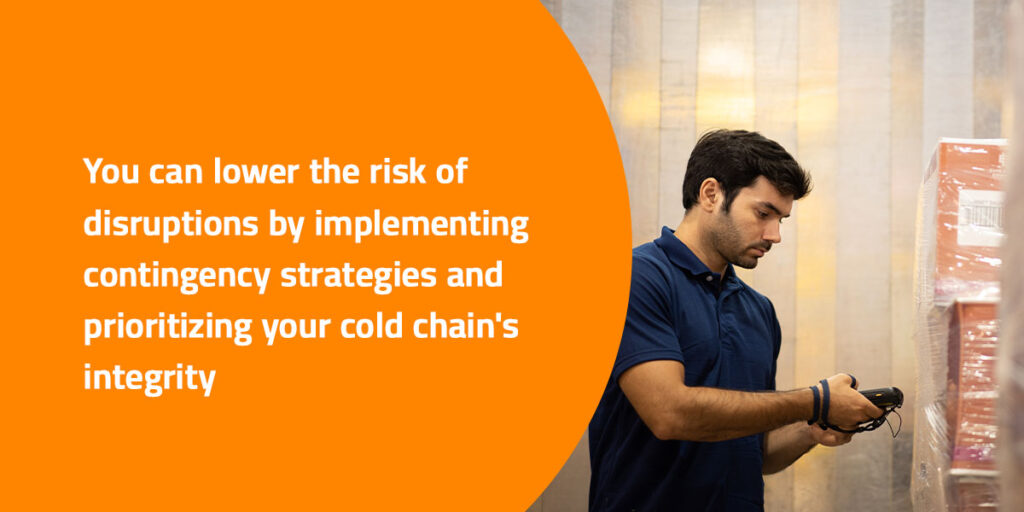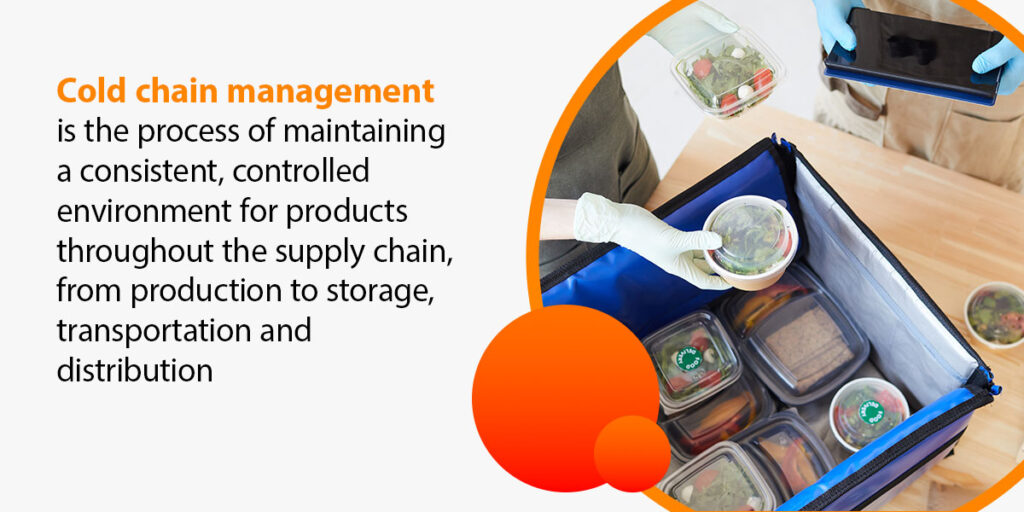Ensuring Uninterrupted Cold Chain Management

Industries that rely on storage and transportation for temperature-sensitive products like food, pharmaceuticals and vaccines need continuous cold chain supply management. Uninterrupted cold chain management safeguards product integrity, ensures regulatory compliance, protects public health, lowers potential financial losses and boosts customer trust.
Your business can effectively manage the complexities of thermosensitive product management by prioritizing stable production, storage and distribution. Learn how to minimize the risk of temperature fluctuations by partnering with a reputable cold chain logistics provider.
What Is Cold Chain Management?
Cold chain management is the process of maintaining a consistent, controlled environment for products throughout the supply chain, from production to storage, transportation and distribution. The market for this industry may reach $647.47 billion by 2028, demonstrating that organizations increasingly prioritize the correct handling of perishable goods. Uninterrupted cold chain management is crucial for several reasons, including regulatory compliance, public health, safety and factors like these.
- Product integrity: Temperature-sensitive products like biologics and vaccines can quickly degrade with improper handling. Keeping them within their recommended storage conditions ensures these products stay potent, efficient and safe for consumers.
- Cost efficiency: Spoilage can significantly impact your income and overheads. Consistent cold chain management lowers the risk of product waste and the associated financial losses.
- Customer satisfaction: Delivering high-quality, undamaged products boosts customer and stakeholder trust. Confidence is essential for building and maintaining long-term relationships that keep your business running.
The following industries use this management system.
- Perishables: Businesses that produce and distribute food and beverages like meat, fruits, dairy and processed foods need cold storage.
- Health care: Freezing vaccines, medical samples and some medicines allows companies to transport them worldwide without sacrificing their integrity.
- Florists: Florists need to keep plants and flowers fresh without subjecting them to too much cold. They use refrigerated storage and transportation to help these products stay pristine longer.
- Curators: Many museums keep their artwork in cold storage when it is not on display.
- Chemicals: Chemicals used to manufacture cosmetics, pesticides and fertilizers stay preserved in cold storage during shipping.

How Does the Cold Chain Work?
The cold chain keeps a consistent temperature-controlled environment for thermosensitive goods at every stage of the supply chain. It involves strict control and monitoring of temperature conditions during storage, transportation and distribution. You can implement various measures to ensure uninterrupted cold chain management, like using specialized refrigerated storage facilities, packaging with insulation, temperature monitoring systems and emergency planning.
Third-party logistics providers play a vital role in this process. They offer expertise and the proper infrastructure and can tailor their services to meet your product’s needs. 3PLs ensure your cold chain management is interruption-free with dedicated cold, freezer and climate-controlled storage facilities, refrigerated transportation and advanced temperature monitoring technologies.
Maintaining Integrity From Storage to Distribution
You can lower the risk of disruptions by implementing contingency strategies and prioritizing your cold chain’s integrity. These proactive measures will help you safely and effectively store and transport temperature-sensitive products.
- Adequate packaging: Insulated packaging and refrigerated containers maintain a perfect temperature. These components must be durable and able to withstand temperature fluctuations, as temperature-sensitive goods often become unusable, causing safety hazards when unregulated temperatures hit.
- Temperature monitoring: Implement systems like radiofrequency identification and tracking technology to alert you of sudden temperature fluctuations. If you receive a notification, you can quickly intervene and prevent product spoilage or degradation.
- Quality control: Mismanaging fridges or freezers can cause microbial growth, affecting your products’ integrity. You must monitor cooling systems regularly to mitigate this risk. You can do this by calibrating and maintaining temperature-controlled equipment like refrigeration units and monitoring devices.
- Collaboration and communication: Foster open cooperation among all parties in the cold chain. Clear lines of communication and protocols with managers, distributors, regulatory agencies and logistics providers will ensure the correct people respond to emergencies promptly.
- Training and education: Train your staff on handling procedures, emergency response and temperature handling protocols. Maintaining product integrity is simpler when all stakeholders understand the importance of the cold chain and the potential consequences of temperature fluctuations.
- Compliance with regulations: Stay up to date with regulatory requirements and industry standards for cold chain management to avoid penalties and maintain product integrity. These include temperature thresholds, record-keeping obligations and documentation requirements.
Common Challenges and How to Overcome Them
Develop contingency plans to address unforeseen events that can disrupt the cold chain. Power outages, equipment malfunctions and adverse weather conditions are a few challenges you should plan for. Others include the following variables.
- Transport delays: Transportation breakdowns can lead to lost revenue, damage to cargo and temperature-sensitive goods degradation during transition delays. The best way to overcome this challenge is to schedule routine vehicle maintenance, identifying potential causes for concern early on.
- Human error: Improper handling or failure to adhere to standard operating procedures can compromise your cold chain. With comprehensive training, strict quality control measures and automation technologies, you can lower the risk of human error that disrupts cold chain management.
- Supply chain complexity: Complex supply chains with multiple stakeholders and handoff points increase the risk of cold chain interruptions. Combat this by fostering communication and collaboration among all parties and using technology for added real-time visibility to streamline processes. Using a single 3PL will also lessen handoff points and the potential for interruptions.
- Environmental factors: Humidity and outside temperatures can compromise your cold chain management. Monitor weather forecasts and adjust transportation schedules around them. Invest in insulated packaging to protect products from damage and external environmental conditions.

Cold Chain Logistics Solutions With Central Florida Freezer
Simplify cold chain management for vaccines, food and other perishables by proactively addressing and implementing mitigation strategies. These measures will help your business boost its reliability and resistance to cold chain interruptions, consistently delivering safe and efficient temperature-sensitive products.
At Central Florida Freezer, we offer a practical and reliable solution to your cold chain management needs. From cold storage to refrigerated transportation to cross-docking, picking and packing, we will keep your products at consistent temperatures. Learn more about our services or request a quote and partner with an experienced 3PL for your business today.

No comments yet.